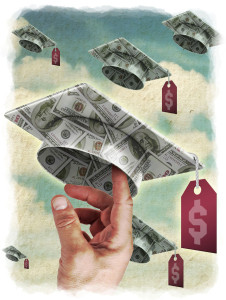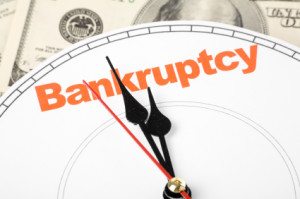March 7, 2015
 The concept of just making interest-only payments on your student loan while still in college sounds like a simple concept. This will require you to only pay the interest off on your loan without actually paying off the principal that the loan is based out of.
The concept of just making interest-only payments on your student loan while still in college sounds like a simple concept. This will require you to only pay the interest off on your loan without actually paying off the principal that the loan is based out of.
Here’s the Rundown
For an unsubsidized loan, interest accrues on day one after you’ve taken the loan out. The formula banks use to calculate interest is: rate x loan balance / 365 = daily interest. So if you take $4,000 to pay for college with 3.86% interest, the amount of interest you’ll accrue on the first year will be $154.4. If you take another $4,000 loan the next year, your principal now being $8,000, your interest will be $308.8. At the end of 4 years in college, taking out the same loan amount every year, the interest you would have to pay would climb to $1,544. If you’ve paid off your interest during college, the amount you’ll end up owing will be $16,000 instead of $17,544 when it comes time to paying down your loan.
You can make monthly payments each year to pay your interest while in college: $12.86 for year one; 25.73 for year two; 38.6 for year three and 51.46 for your last year of college. If you paid off your interest during your years in college, you’d avoid a term called interest capitalization which basically means interest accruing on top of interest. Essentially, you’ll end up saving a lot of money making this financial strategy very valuable. Here are a few other positives to paying off your interest while in college.
It Encourages Positive Habits
It is easy to fall behind on your payments if you don’t have sensible habits. You just need to consider making a good habit of paying off your debt whatever you have taken in form of loan. Interest-only payments on your loan will help you get into the habit of saving money for your loan and can even help you adjust your finances properly. It is critical for you to think about how you’re going to manage your finances when it comes to getting such good habits to work for your life in the long run.
It Manages Your Credit
You may find that your overall credit rating will be a little easier for you to work with if you just manage your debts the right way. By keeping the charges on your student loan from being too high while also making payments on time, you will find after a while that your student loan will do more to help your credit rating. This can be critical for any of the different forms of credit that you might require at some point in the future.
It Keeps Your Debts Organized
More importantly, you might find that your payments will be a little easier to manage over time. You will have a good idea of what you would have to spend in order to get your debts covered. Of course, you can always choose to pay a little extra every once in a while to cover a part of the principal but the fact that you can keep your debts from being a burden to your life is a point that is great in its own right.
You have to see that interest-only payments are going to work well for your demands. You can get more out of these payments as you will keep your costs down while being astute with your responsibility to take care of what you owe.
A Few Ways you Can Afford Making Monthly Interest-Only Payments
If cash is really tight, there are some things you can do to afford making those interest-only payments on your loan. You can reduce the amount of your loan by seeking out easy scholarships to apply for that’ll help pay for school. You can also find a part-time job or find a few online gigs like being a virtual assistant, selling services on Fiverr, or getting paid to write articles on iwriter or text broker.
Tags:
Debts,
Education Loans,
financial planning,
loans,
Pay Off Debts,
personal finance,
student loans
March 6, 2015
 Developing an effective and sound budget is truly important or crucial when you wish to achieve financial targets, control household costs and manage debts. A budget is the key ingredient to achieving financial goals, achieving household goals and managing debt successfully. Apart from this, by creating a budget you may pay off debt, buy a bigger apartment and get a better car.
Developing an effective and sound budget is truly important or crucial when you wish to achieve financial targets, control household costs and manage debts. A budget is the key ingredient to achieving financial goals, achieving household goals and managing debt successfully. Apart from this, by creating a budget you may pay off debt, buy a bigger apartment and get a better car.
A sound budget can only be developed when you understand your entire financial situation in a better way. You may experience a lot of challenges while creating a budget that suits your young family. In your attempt to develop a smart budget, you might wonder how to begin with it. Developing a budget is about identifying the starting point and the steps to go with it. There are a few good websites that may help you prepare an effective budget. In order to catch up with the best sites across major search engines, you may click on Check n’ Go•.
Consider a few budgeting tips that will keep you motivated –
1. Note all expenses
All of your monthly expenses need to be written in a notepad. Make a list of each single item that you purchase every month. Record all goods that you use on a daily basis, be it those ice creams that you keep on the refrigerator, your parking meter charges as well as your morning coffee.
Although it might seem tedious it will work in your best interest. Once the costs are itemized, you’ll need to go through the list and find which items are absolute necessities. You may try creating two categories namely discretionary and essential. You’ll certainly come to know how much you can actually avoid spending or save out of your list of expenses.
2. Exercise discipline
In order to stay within a tough budget, you’ll need to count on your means and exercise discipline and self-control. You must learn how to cope with the challenges of staying within a budget. There is a certain trick to get things done while staying within your budget. A budget resembles a diet; you’re bound to shed a few pounds once you start having lettuce leaves for about 7 days. You don’t need to live without fulfilling your daily necessities. For an occasional reward or treat, a certain allowance needs to be incorporated within your budget.
3. Set your targets
Set achievable targets. This way, you’ll be able to analyze each of your moves and proceed without committing mistakes. Meeting new targets will be easier once you reach your initial goals.
4. Use an online budget plan
You’re bound to come across a number of online budget planners that come for free. A majority of the budget plans are friendly towards their users. A budget planner helps you to measure the out flow of your money. Once you can measure your expenses, it will be easier for you to manage them.
5. Seek assistance
You may use free information available over the internet for maintaining or developing a budget. When it comes to promoting financial websites bearing quality budget tips, you may utilize sites like Check n’ Go•. Websites like this are aimed at educating people on budgeting and other financial areas.
Tags:
budgeting,
Debts,
Earnings,
economy,
money,
personal finance,
savings
February 8, 2015
 Filing for bankruptcy is a drastic step in regaining your financial health, and the impacts are long-lasting. It is not something to be done lightly, or without weighing out all of your available options. If you are drowning in debt, however, bankruptcy can be a valuable first step in rebuilding your financial future.
Filing for bankruptcy is a drastic step in regaining your financial health, and the impacts are long-lasting. It is not something to be done lightly, or without weighing out all of your available options. If you are drowning in debt, however, bankruptcy can be a valuable first step in rebuilding your financial future.
GetFreeOfBills.com notes that bankruptcy comes in two forms: Chapter 7 and Chapter 13. While Chapter 7 allows you to discharge most debts, Chapter 13 requires you to follow a structured plan to repay your debts under more favorable terms. Depending on the amount of disposable income you have, you might be required to file Chapter 13. Regardless of which type you file, however, the pros and cons are generally the same.
Pros
- Clean slate: A bankruptcy provides a clean slate. It effectively resets your credit to zero, except for the debts that cannot be discharged such as student loans, recent back taxes, and child support. It provides you with the opportunity to stop making costly payments and provides you with more money to live on each month.
- Opportunity to rebuild: Some people believe that bankruptcy prevents you from ever having credit again, but this is not the case. Many people manage to build new lines of credit shortly after their bankruptcy, and it gets easier as time passes. While it is true that bankruptcy remains on your credit report for 10 years, its effects gradually lessen.
- Stopping adverse collections actions: If you are being hounded by creditors, facing foreclosure, or afraid that your wages will be garnished, bankruptcy can be a psychological relief. When you file for bankruptcy, you will receive an automatic stay from the court. This forces your creditors to cease all adverse collections activities against you. If you have a bankruptcy attorney, he or she will also act as a shield, handling creditors on your behalf.
- Exemption laws: Your home and car are generally exempt from bankruptcy, as long as you continue to meet your payment obligations. You are also entitled to a cash value for personal possessions. If you have a significant number of luxury possessions, you might be required to sell some, but the exemptions are generally high enough to let most people keep their personal items.
- Job protection: Although some employers will not hire applicants with a bankruptcy on their credit report, the job you already have is protected. It is illegal for an employee to be fired for declaring bankruptcy.
Cons
- Damaged credit: Bankruptcy is a major hit on your credit report. In the immediate aftermath of the bankruptcy, you might be unable to get any new credit at all. Although it usually does not take long to get new offers, you will fall into a high risk category for lenders. Expect to pay interest rates that are significantly higher than the ones you had prior to your bankruptcy. However, if you are in the position of filing for bankruptcy, your credit is probably already damaged. Some people find that the credit hit is much less significant than they anticipated.
- Filing costs: Filing for bankruptcy typically costs a few hundred dollars, depending on your location. Attorney’s fees are billed on top of that. However, in most cases you can make a payment arrangement if you can prove that paying a lump sum would present a financial hardship.
- Embarrassment: Although it is surprisingly common, filing for bankruptcy still carries a certain stigma. Some people worry that their loved ones will find out and ultimately think less of them for their decision. However, bankruptcy typically comes at the end of a long journey through mounting debt. Most people understand that sometimes life happens, and do not judge their friends and relatives for making a tough financial decision. Besides, having your home foreclosed or your car repossessed is not exactly a less embarrassing option. When taken seriously and only as a last resort, bankruptcy can actually be the smartest choice for some situations.
- Exempted debts: Some debts cannot be discharged in a bankruptcy, including recent back taxes, child support, and student loans. In addition, most people choose to keep their mortgage and car loan, if applicable. However, discharging your other debts will create more available money each month, which can then be diverted toward paying your remaining obligations.
Bankruptcy is not for everyone, but it is the best solution for many people. Attorney David M. Often of Get Free of Bills understands the complex decision-making process that is involved in determining whether bankruptcy is the right choice for you. Contact his office today for professional advice on how to proceed along your journey to financial freedom.
Tags:
Bankruptcy,
Bankruptcy Laws,
budgeting,
Credit Card,
Credit Card Debt,
Debts,
Financial Panning,
Laws,
money
January 11, 2015
 In October 2014, the personal saving rate, the ratio of personal income saved to personal net disposable income, was only five percent in the United States. Americans are not known for being savers; the all-time high for personal saving ratio was 14.60 percent in 1975 which is lower than many developing countries.
In October 2014, the personal saving rate, the ratio of personal income saved to personal net disposable income, was only five percent in the United States. Americans are not known for being savers; the all-time high for personal saving ratio was 14.60 percent in 1975 which is lower than many developing countries.
The truth is, life happens and it can often be expensive. By building your savings into a nest egg, you will be better prepared for these developments.
A Nation of Spenders
Almost half of American households (44 percent) have no more than three months of expenses in a savings account, leaving them unprepared for medical, legal, or other emergencies. Many rely on credit which accumulates expenses through interest rates and in some unfortunate circumstances, late or missed payments.
The National Foundation for Credit Counseling conducts a survey every year on consumer financial literacy. According to the latest survey, 16 percent indicated that their emergency fund was insufficient. The same percentage also admitted to not having enough in savings to retire.
Saving Is Necessary
Relying on credit instead of stashing away money is a risky game. As your balances rise, so do interest rates and fees. Many people file bankruptcy because they do not keep up with servicing their debt.
As this pattern continues, credit scores drop but life does not stop happening. If a car needs brakes, a water heater blows up, or you get sued or face legal charges and need to pay criminal defense lawyer fees, this means having to find money quickly. A household that is liquid asset poor is also vulnerable to predatory lending that only deepens financial insecurity.
Get Started
The economy is unpredictable and only a healthy savings account ensures stability. The time to develop this habit is now. Here are suggestions to get started:
- Start Small. Even if you only transfer $5.00 from every paycheck into savings account, it is better than nothing. The trick is to make this a habit and putting aside a small amount will accomplish that. You will likely increase this amount later, due to the satisfaction of saving.
- Set a Goal. A $1,000 emergency fund covers most every day emergencies like car or home repairs. While legal fees and medical bills could easily wipe out a fund of this size, $1,000 is a good goal to start saving. Break it into two $500 goals if that seems more feasible.
- Schedule Automatic Transfers. Some employers offering direct deposit will allow you to split your paycheck into two accounts. If that is possible, arrange a certain amount for your savings account. Otherwise, set up an automatic transfer from checking to savings at each pay period so the saving process occurs despite any lapses in discipline.
A nest egg means an emergency becomes an inconvenience instead of a disaster. If you are relying on credit or living between paychecks, take it as a sign to change your financial habits. Rather than mull over your mistakes, take action today to start a good savings plan.
Tags:
budgeting,
Credits,
Debts,
financial planning,
money,
personal finance,
savings
October 19, 2014
 The credit card is completely different to the original concept of the idea of using credit. While the original credit card was paper, this quickly developed to the plastic one that adorns many purses and wallets around the world.
The credit card is completely different to the original concept of the idea of using credit. While the original credit card was paper, this quickly developed to the plastic one that adorns many purses and wallets around the world.
The original idea behind the credit card was to pay the debt in full at the end of each month. You only became eligible for a credit card if you were a special and privileged client. Often the banks lost money on the credit card, with high fees, but this didn’t matter if it meant a customer was happy and loyal. The change in the use of the cards is apparent as customer’s now, often have balances from previous months spending.
However, slowing the evolution of the credit card took place and it was no longer a privileged accessory but one many people demanded as an easy access to some form of credit.
A credit card has become a necessity in the majority of homes; it pays for luxuries but also a way to pay for the essentials. With the companies competing for the larger slice of credit from the consumers, more and more people opted for the credit card as a way to pay for everyday life.
While improvements in the economy is a positive angel, wages have stayed comparatively low. This has led consumers to look for credit in all places and credit card companies have obliged.
What is staggering is the fact that in 2008 credit card transactions over took cash transactions in America. This is a worrying statistic in the current economic climate.
However, life has changed.More and more families are in a lot of debt due to the credit cards and rising housing costs. Consumers are struggling with the debt they are experiencing, the credit card companies are continuing to push the cards and increase the amount of debt.
Credit problems are bad that the amount on bankruptcies are increasing, meaning the credit card companies are potentially losing money through bad debt.
However, whilst this might seem that the evolution of the credit card is bad, the changes haven’t completed and there is still hope for the future.
Tags:
Credit Card,
Credit Card Debts,
Debts,
economy,
money,
personal finance
 The concept of just making interest-only payments on your student loan while still in college sounds like a simple concept. This will require you to only pay the interest off on your loan without actually paying off the principal that the loan is based out of.
The concept of just making interest-only payments on your student loan while still in college sounds like a simple concept. This will require you to only pay the interest off on your loan without actually paying off the principal that the loan is based out of.




Recent Comments